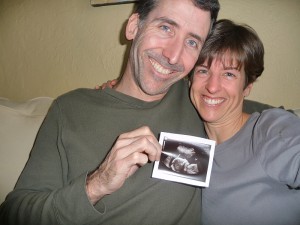Our son’s birth parents, Lizzie and John, will be visiting California in a couple of months and we are talking about the possibility of meeting up with them briefly on a mini road trip down to southern California. This could be a new experience for us meeting up with them on the left coast since in the past we’ve always traveled back to the east coast where they live. This particular meeting would also be unique because Lizzie will be traveling with her brother so we might have the opportunity to meet a first of our son’s extended family members – an opportunity that is a rarity for us living so far from them. These extended family members are very much a part of our adoptive family since they are part of our son’s story. I would be very curious to see what traits in her brother that I see in our son – if any. I have seen some of myself in my brother’s daughter so I know that the likelihood of our son carrying some of Lizzie’s brother’s traits is a real possibility.
This possible meeting with Lizzie’s brother has brought to the surface an issue I haven’t put much thought into before: how would we address him to our son? He is his biological uncle, yet, would HE feel weird with us calling him ‘Uncle?’ It seems weird to say ‘birth Uncle’ or ‘biological Uncle’ and even weirder not giving him any distinction at all. He is an uncle as much as my brother and my brother-in-law are plus it is important for our son to realize that he is part of his biological family. We use the terms ‘aunt’ and ‘uncle’ loosely at times with some of our closer friends when there is no relation to them so it seems a bit insulting not to use uncle with Lizzie’s brother who more than anyone deserves the use of the word.
The whole dilemma on what to call Lizzie’s brother brings to mind an article I read just recently about a Russian adoptee Olympian meeting her birth family for the first time when she traveled to Russia to compete in the Olympics this past winter. The article talked about how the adoptive parents and the adopted child dropped the ‘birth’ title completely when talking about the young woman’s biological family. They simply referred to her biological roots as her family and specifically her biological parents as her ‘parents.’ According to the article there was no threat to the adoptive parents or guilt from the adoptee of potentially insulting her adoptive family. The Russian girl was simply connecting with her family in which she shared genes. Why is this news at all I wondered when thinking more about the article? Why more people don’t take this approach when talking about an adoptees biological family was beyond me since it seemed so logical. Then I decided to ask myself some questions.
“Would I have a problem referring to any of our son’s biological extended family members as ‘uncle,’ ‘aunt,’ ‘grandparent’ or other?” Absolutely not. I feel his biological family members are as much family to our son as his adoptive family. But when I asked myself the question, “Would I feel comfortable at this point referring to Lizzie and John as our son’s ‘parents’ without ‘birth’ in front of it?” And my answer is decidedly no, but when he is older, perhaps yes. “Why? Aren’t Lizzie and John equally his parents biologically as Scott and I are through adoption?” When it comes to the two sets of parents (biological and adoptive) I feel it is best to give the term ‘parent’ to those who are actually currently parenting the child. It is important to differentiate the two, especially when our a child is still so young and he is learning the language. Helping our son clarify what birth vs. adoptive means is important and I think Lizzie and John might agree here.
At this current moment, Scott and my role as adoptive parents is weighing more heavily than Lizzie and John’s biological side as it takes a great amount of effort and energy to raise a child. When Lizzie was pregnant with our son and we were waiting for him to be born I felt that they were far more the ‘parents’ at that moment while we were clearly the ‘adoptive’ parents. I suspect that when our son is older and is no longer living with us, again the tides will shift and we will be at that point where we’re truly equals: adoptive parents and birth parents – or simply all just ‘parents.’
Perhaps the main reason why the Russian adoptee and her family not using ‘birth’ in front of parents is newsworthy is because of an unspoken, larger meaning in doing so: it quietly equalizes the roles of the adoptive family and the biological family implying that one side is no more important or valuable than the other in the long run. Dropping titles of ‘birth’ and ‘adoptive’ before the words ‘mother,’ ‘father,’ or ‘family’ could be a very interesting and powerful concept to explore in the adoption world going forth, if and when individual adoption situations warrant it.

